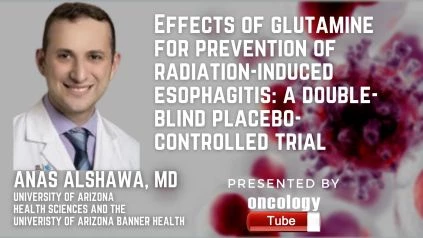Anas Alshawa, MD from the University of Arizona speaks about the Effects Of Glutamine For Prevention Of Radiation-induced Esophagitis: A Double-blind Placebo-controlled Trial.
Link to Study:
https://pubmed.ncbi.nlm.nih.gov/33580845/
Synopsis:
The goal Acute radiation-induced esophagitis (ARIE) causes treatment delays, a reduction in quality of life (QOL), and secondary complications such as weight loss. Grade 3 ARIE occurs in 15 percent to 30 percent of patients having esophageal irradiation, resulting in treatment interruption or cessation. The goal of this research was to see how glutamine, a common dietary supplement, affected ARIE in patients with thoracic cancers. Patients and procedures Patients with advanced thoracic malignancies were included in this double-blind, placebo-controlled experiment who were receiving concurrent chemotherapy/radiotherapy or radiotherapy alone, with esophageal radiation doses of 45 Gy. Patients were given either 4 g of glutamine or a glycine placebo twice a day in a one-to-one ratio. The study’s main goal was to see if glutamine reduces the severity of ARIE in these patients. Secondary goals included determining the effects of glutamine on various ARIE parameters, weight, and symptom load as measured by the MD Anderson Symptom Inventory (MDASI-HN) questionnaire, as well as the glutamine toxicity profile. Conclusions There were 53 individuals enrolled at the time of intermediate analysis: 27 in the glutamine arm and 26 in the placebo arm. In the first 6 weeks of radiation, there was no change in the incidence of esophagitis between the glutamine and placebo groups (74 percent versus 68 percent; P = 1.00). In terms of time to esophagitis onset, there were no significant differences between the two arms. The glutamine arm had a shorter ARIE (6.3 versus 7.1 weeks; P = 0.54) and a smaller median weight loss (0.9 kg versus 2.8 kg; p = 0.83) than the placebo arm. The groups vary in core symptom severity (2.1 vs 1.5, p.03), but not in head and neck specific symptom severity (1.2 vs 1.1, p.60), or symptom interference (2.1 vs 1.7, p.22). There were no adverse events of grade 3 or above that may be linked to glutamine. Following interim analysis, the trial was deemed futile and ended. last thoughts In patients with advanced thoracic malignancies receiving esophageal radiation, oral glutamine was not linked with substantial improvement in ARIE severity, weight loss, head, and neck specific symptoms, or symptom interference as compared to placebo. The trial number is NCT01952847, and the registration date is September 30, 2013.
Clinical Trials – NCT01952847 –
http://clinicaltrials.gov/show/NCT01952847

